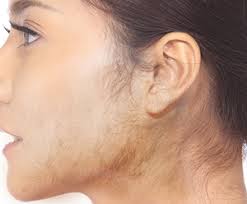
Hirsutism is excessive hair growth in certain areas of a woman's face and body, such as the mustache and beard area, that creates a "male pattern" of hair. Women normally can have fine, pale, faintly visible hair in these areas, but heavy hair growth in a male pattern with coarse or colored hair is not expected.
About half of all people with hirsutism have an excess of androgens. These hormones usually trigger male physical and sexual development. Women normally have low androgen levels, but these levels might vary for a range of reasons. Higher levels can overstimulate the hair follicles, leading to more hair growth than a woman would normally experience.
Hirsutism Symptoms
-
Significant growth of hair on the upper lip, chin, sideburn area, and around the nipples or lower abdomen.
-
Oily skin
-
Acne
-
Hair loss, known as alopecia
-
A receding hairline
-
An enlarged clitoris
-
A deeper voice
Hirsutism Causes
Increased levels of androgens or oversensitivity of the hair follicles to androgens can cause hirsutism. High levels of insulin, a hormone that “unlocks” cells to absorb energy from sugars, might also contribute to the development of hirsutism. Insulin can stimulate the ovarian cells to produce androgens. Excessive hair growth in women with normal androgen levels, regular menstrual periods, and no other underlying conditions is called idiopathic hirsutism.
Hirsutism Treatment
If a specific cause of hirsutism becomes clear, the doctor may suggest appropriate treatment for that cause. If insulin levels are high, reducing them may lead to a reduction in hirsutism. Women who have a high body mass index (BMI) might find that a weight loss program reduces androgen levels and therefore the symptoms of hirsutism.
Diet Therapy in Hirsutism
Certain dietary habits such as eating plenty of foods that contain B vitamins, chromium, and magnesium may help prevent and treat hirsutism, while other eating habits may worsen or even cause hirsutism in susceptible women.
Some Nutritional Points for Hirsutism:
ü Cut down on calories, especially in the evening: A high energy intake has been associated with an increased risk of hirsutism, mainly because it can contribute to the development of excess body weight and obesity which in turn promotes hyperandrogenism in women.
In addition to restricting the number of calories consumed, overweight, hirsute women should pay attention to the timing of the daily caloric intake. To keep your metabolism running and to avoid cravings, spread the calories throughout the day by having 5-6 small meals.
ü, Follow a low glycemic diet with sufficient amounts of protein.
ü, Step up your vitamin B intake.
ü Watch out for fats but don't eliminate all fats.
ü Eat plenty of foods that contain chromium: It helps maintain normal blood glucose levels by making insulin more efficient. Good dietary sources of chromium include romaine lettuce, onions, tomatoes, whole grains, and potatoes.
ü Consume magnesium-rich foods: There is a strong link between magnesium deficiency and insulin resistance associated with hirsutism.
Best foods for hirsutism
-
Green Tea
-
Cinnamon
-
Spearmint
-
Apricots
-
Sunflower Seeds
-
Barley
-
Tuna
-




